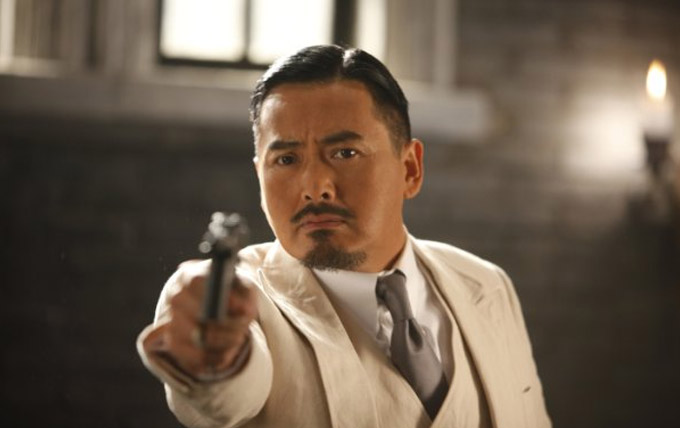 With the Asian film market looking to put out blockbusters that can stand tall next to American behemoths, there occasionally comes a picture that owes as much to Sergio Leone as it does to, say, Michael Bay or Ridley Scott. Jiang Wen’s “Let The Bullets Fly” revels in breathtaking, breakneck pacing but still manages to feel like an absolute slog at 132 minutes, the middle weighing the film down to the point of viewer exhaustion. That said, “Bullets” is fit to stand in the company of Kim Ji-woon's triumphantly manic “The Good, the Bad, the Weird,” a film that is more stylish at the expense of character development, which Wen’s film piles on in swaths of intertwining dialogue delivered at a machine gun pace. It's not Atlman, to be sure, but it still feels more alive than tough guys in trench coats spitting words at each other across a godforsaken, arid landscape.
With the Asian film market looking to put out blockbusters that can stand tall next to American behemoths, there occasionally comes a picture that owes as much to Sergio Leone as it does to, say, Michael Bay or Ridley Scott. Jiang Wen’s “Let The Bullets Fly” revels in breathtaking, breakneck pacing but still manages to feel like an absolute slog at 132 minutes, the middle weighing the film down to the point of viewer exhaustion. That said, “Bullets” is fit to stand in the company of Kim Ji-woon's triumphantly manic “The Good, the Bad, the Weird,” a film that is more stylish at the expense of character development, which Wen’s film piles on in swaths of intertwining dialogue delivered at a machine gun pace. It's not Atlman, to be sure, but it still feels more alive than tough guys in trench coats spitting words at each other across a godforsaken, arid landscape.
 Like a good ol’ Western, we open on a train robbery that, while marred by horrendous CGI, serves as a potent introduction to two of our protagonists: "Pocky" Zhang (Jiang himself) and Tang (Ge You). The setting is 1920s China, a land split between warlords and roaming gangs. Tang is on his way to Goose Town, where he intends to ascend to governorship and bleed the town dry. When Zhang curtails the ride permanently and fishes the would-be-official out of the wreckage, Tang wisely bargains for his life by offering to stay on as counsel for the new “governor,” Pocky himself.
Like a good ol’ Western, we open on a train robbery that, while marred by horrendous CGI, serves as a potent introduction to two of our protagonists: "Pocky" Zhang (Jiang himself) and Tang (Ge You). The setting is 1920s China, a land split between warlords and roaming gangs. Tang is on his way to Goose Town, where he intends to ascend to governorship and bleed the town dry. When Zhang curtails the ride permanently and fishes the would-be-official out of the wreckage, Tang wisely bargains for his life by offering to stay on as counsel for the new “governor,” Pocky himself.
As the bandit and his entourage waltz into town with Tang and his wife in tow, they find immediate opposition in Master Huang (Chow Yun Fat, in a role that must be played by Jeremy Irons in a remake). Huang rules from behind fortified walls in a lavish fortress and sees the transitioning governors of Goose Town as beggars at best and playthings at worst. When a rising tide between Zhang and Huang claims the life of one of Zhang’s closes compatriots, the war is on.
Although many a bullet does in fact fly, Jiang’s deeper interests lie in the barbed dialogue that his characters deliver as deftly as they wield their old school weapons. While the cast is expansive, we spend the most time with Zhang, Tang and Huang, three men who’ve cloaked themselves in an ever-changing array of ideals, morals and social standards. As Zhang transitions from an impostor to a heroic statesman, Jiang never lets us forget that the steadfast leader remains a bandit at heart, his ideals malleable, just as Tang looks to weasel out of imminent danger and Huang pulls the strings while boasting of his powers.
 This obsession with dialogue makes the action clashes feel frequently uneasy – the film transitions roughly from drama to comedy and back again. The stakes are rearranged, and when characters go out, they do so violently and with enough bloodshed to disturb the casual viewer. Frequently it’s uncertain whether this is played for laughs and the film loses some steam in the second act, which is dominated by drawn out conversation punctuated by sudden acts of harm.
This obsession with dialogue makes the action clashes feel frequently uneasy – the film transitions roughly from drama to comedy and back again. The stakes are rearranged, and when characters go out, they do so violently and with enough bloodshed to disturb the casual viewer. Frequently it’s uncertain whether this is played for laughs and the film loses some steam in the second act, which is dominated by drawn out conversation punctuated by sudden acts of harm.
Jiang is a talented helmer and this film demonstrates a very dark wit to go with set pieces that hit familiar beats while remaining enjoyable due to the clean camerawork (Zhao Fei, a masterful DP who’s worked with both Woody Allen and Zhang Yimou). The running time really does hurt the film, but if gluttony beckons ambition, this is the way to do it. [B]

